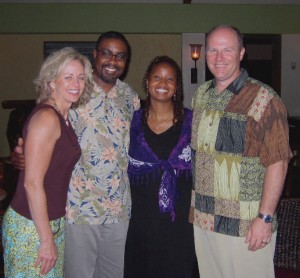A Credible Witness, by Brenda Salter McNeil
This is the second time I’ve read A Credible Witness by Brenda Salter McNeil. That tells you how much I value the insights that Brenda offers. And since I just saw Brenda at a PathLight event in Seattle, now seemed the right time to post a review.
A Credible Witness is subtitled, “Reflections on Power, Evangelism, and Race.” It’s a brilliant look at the story of the woman at the well. Brenda (who can be reached here) pulls so much out of that story and challenges us to look at how our hearts view people of a different gender, race, world view, etc. But importantly, the book reflects on how our misguided viewpoints can derail opportunities to share our faith. We let our focus on power get in the way of true relationship. As Brenda writes, “…evangelism and reconciliation are two sides of the same coin.”
One of my favorite images from the book is that we often only preach the vertical truth of the cross: our reconciliation to Christ. But that there is also a horizontal truth to the cross: our reconciliation with each other. Without both planes of truth, the cross is just a stick that we use to beat people over the head. A clever image!
A key portion of the book talks about humility and the need to set aside our control of power. Brenda, an African-American woman, could easily use this section to lecture white males like me. But she is not that way (which is what makes reading her writing so helpful) and often uses her own mistakes as teaching lessons. She’s transparent about her own failings at racial reconciliation, which is heartwarming and helpful because it makes me less concerned with the inevitable mistakes that I make.
One challenging thing she does write is, “If you are a member of the dominant culture, you may be seen as as symbol of the group that has often hurt, oppressed, and dominated others.” I’ve had that experience and felt unjustly accused, but I understand it better now. Time spent on racial reconciliation — and specifically on being very intentional about reaching out to those from non-dominant cultures — has given me the confidence to be the falsely accused from time to time. But in the same way, I’ve grown to recognize that even if I’ve never perpetuated an act of injustice to a person of color, I have benefited from what I call white privilege. Understanding that, and repenting of that, is a step toward real reconciliation. And Brenda’s work makes that a healthy process.
I could go on about the book, but you get the idea. I’m currently part of a team from my church that is looking at diversity issues. Working with these folks has been a joy, and I owe Brenda and her husband Derek a great deal for their mentoring on the topic. Though they are likely to dismiss that and consider me an equal brother in our efforts to build the Kingdom, the truth is that I have much to learn from both of them. And I’m thankful for their generous spirit.
So, read this book. You will not be disappointed. You will be challenged. And you will learn to think differently about your neighbor.


